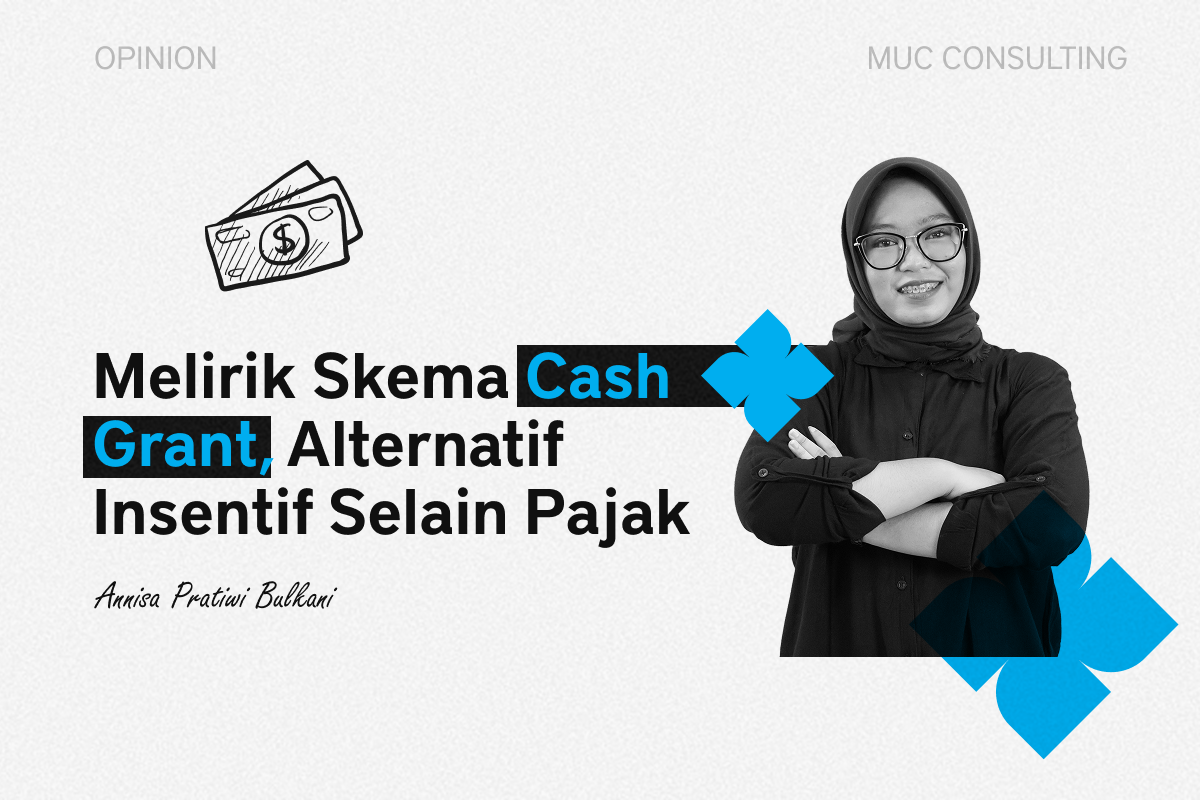Exploring the Cash Grant Scheme: An Alternative to Tax Incentives

Tax incentives and investment are often likened to sugar and ants—the sweeter the incentive, the more investment a country tends to attract. For this reason, many countries offer tax discounts to entice global corporations to view them as attractive investment destinations. This phenomenon is commonly referred to as a “race to the bottom.”
Unfortunately, amid tariff wars, this strategy has proven to be counterproductive to the global economy. In response, a number of countries, led by the OECD/G20, have introduced the Global Minimum Tax (GMT) policy. GMT is a regulation that prohibits countries from offering tax incentives below 15%, as part of a broader two-pillar solution.
Indonesia is among the countries adopting this policy, through Minister of Finance Regulation (PMK) No. 136 of 2024. Under this regulation, any multinational company operating in Indonesia that meets the criteria must comply with the 15% global minimum tax rate.
The challenge, however, is that countries—including Indonesia—remain heavily dependent on investment inflows as a key driver of their economic growth.
Investment Remains a Key Pillar
According to data from Statistics Indonesia (BPS), Indonesia’s economic growth rate of 5.03% in 2024, 1.43% came from investment, or gross fixed capital formation (GFCF). This figure is notably higher than the contribution of government spending, which stood at only 0.48%.
2024 GDP Growth Breakdown
|
No |
Component |
Growth Rate |
Contribution to Growth |
|
1 |
Household Consumption |
4,94% |
2,60% |
|
2 |
Non-Profit Institutions Serving Households ( LNPRT) |
12,48% |
0,16% |
|
3 |
Government Consumption |
6,61% |
0,48% |
|
4 |
Investment (PMTB) |
4,61% |
1,43% |
|
5 |
Eksport |
6,51% |
1,53% |
|
6 |
Imports (deducted) |
7,95% |
1,54% |
|
|
GDB |
5,03% |
5,03% |
Given the critical role of investment in driving economic growth, it is essential to develop non-tax incentive instruments that remain attractive to corporations. One alternative to conventional tax-based incentives is the cash grant scheme.
In the context of investment incentives, a cash grant is a direct financial contribution from the government to individuals or companies in the form of cash payments. The primary goal of this scheme is to encourage strategic economic activities, such as investment, research and development, exports, and job creation.
Unlike conventional tax incentives that reduce tax obligations gradually, cash grants provide upfront funding that recipients can use directly for various business needs, without going through a tax deduction process.
Read: Deferred Tax Adjustments in Tax Calculations Under GloBE Rules
Cash Grant Schemes Across Countries
Several countries have adopted cash grant schemes as part of their incentive policies, including the United States, the United Kingdom, Australia, Singapore, and Vietnam.
In the United States, cash grants are primarily used to support research and development (R&D), particularly in the high-tech and healthcare sectors. Both the UK and Australia have adopted similar schemes to foster innovation in areas such as renewable technologies and scientific research.
Meanwhile, Singapore offers the Enterprise Development Grant (EDG), which provides funding to companies to support innovation and business expansion in strategic sectors.
In Vietnam, a neighboring country, cash grants have become an effective strategy for attracting foreign investment into key sectors. With increasing tax obligations due to the Global Minimum Tax (GMT), Vietnam leverages this scheme to stimulate investment in R&D and ensure the continued growth of domestic industries.
Read: PMK 136/2024: Safe Harbour Provisions in the Transitional Period of GloBE Rules
In addition, the one-time cash grant model is considered more efficient than multi-year tax incentives, as it is easier to monitor and involves lower total costs.
The key advantage of the cash grant scheme lies in its direct impact on businesses. In Vietnam, many companies that are part of multinational corporate networks have been affected by Pillar Two of the Global Minimum Tax (GMT).
Under this regulation, companies may qualify for tax exemptions by factoring in the value of fixed assets and labor costs when calculating their top-up tax.
By distributing cash grants to strategic sectors, Vietnam not only fosters economic stability but also helps reduce the risks of profit shifting and short-term speculative investments.
Increasing Fiscal Burden and Market Distortion
Despite its benefits, the cash grant scheme comes with challenges that must be carefully considered. If not implemented with caution, it may pose several risks, such as increasing the government’s fiscal burden, distorting the market, and potentially triggering inflation.
Because it is a direct government subsidy, the cash grant scheme would draw from the State Budget (APBN). If allocations are made recklessly, it could strain fiscal resources. Additionally, upfront disbursement of cash grants could become a significant burden without proper budget management.
If grants are distributed indiscriminately, they may lead to market distortions that harm certain sectors. Moreover, excessive cash grant funding has the potential to fuel inflation, as it increases the money supply. Without corresponding growth in producing goods and services, this could drive prices up.
Considering both the advantages and risks, Indonesia may evaluate the cash grant scheme as an alternative incentive policy. It offers a quick and effective solution to stimulate strategic sectors targeted for development.
Furthermore, if the funds are directed toward sustainable sectors, the scheme has the potential to support long-term economic growth. However, its implementation must be carefully designed to avoid negative side effects. Therefore, A comprehensive study is necessary before adopting this scheme in Indonesia. (ASP/KEN)
Disclaimer! This article is a personal opinion and does not reflect the policies of the institution where the author works.


